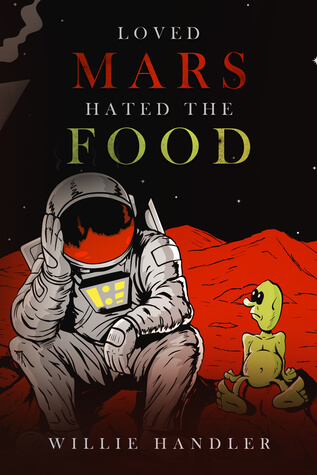
It isn’t often that I get to chat about Mars, satire and food together! Willie Handler, the author of Loved Mars Hated the Food, gave me the opportunity to imagine what life on Mars may be like, while at the same time, thinking more deeply about the life on Earth itself. It is a a humorous novel about a chef who is sent to Mars and, due to an unforeseen incident, befriends Martians. When Dix finds his human colony destroyed, Martians Bleeker and Seepa come to his rescue. I shared my thoughts on Loved Mars Hated the Food in my book thoughts post.
Willie is from Canada and this is his second book. He finds targets for his humor everywhere, whether it is friends, family, co-workers, politicians, farmers, subway passengers, bureaucrats, telemarketers, or Martians. Now it is time to talk to Willie himself!

- I love your writing and the ways in which you explained parts of our culture like potholes and Starbucks to Martians. What was it like to put on a human as well as Martian hat?
It was a challenge to provide a Martian perspective to this solitary Earthling and his culture. What made it interesting was Dix’s need to introduce his culture to aliens. The biggest challenge as a writer was to be consistent in their reaction. In particular, the unusual manner, in which the Martians spoke. Writing the Martian dialogue was painfully slow.
But as in the case with any character you write, over time you get into the head of your characters and whether they are human or alien doesn’t matter. You begin to think like they do.
- What inspired you to use Mars as a setting for this book?
The novel grew out of a short story that I wrote in a writing course I took a few years ago. The inspiration came from a few sources. I wanted to spoof Andy Wier’s book The Martian but in my book the protagonist is not alone but living with Martians. There was also a 1960s TV situation comedy called My Favorite Martian where a Martian is stranded on Earth and must blend in with humans while trying to get back home. I decided to reverse the roles and have a human stranded on Mars under similar circumstances.
- Tell me more about the Martian society that you introduce the readers to in this book.
The Martians claims to be more advanced than humans although they know nothing about human culture. But once he scratches the surface, it’s obvious to Dix that this isn’t the case. Martian society appears to be open and free, but it isn’t. There’s a class system. The elected government has no real power and does not even fairly represent the population. There are arbitrary arrests and incarceration. Initially, Dix is not that concerned with what he sees around him. But over time, he takes a stand against inequality and oppression.
- What was the hardest part about writing this book? What research did you have to pursue to write this novel?
This book is considered speculative fiction, yet I wanted it grounded in reality and science. I wanted the reader to drawn in enough to forget this is nothing but a fantasy. I did extensive research on space travel, conditions on Mars and NASA to provide that grounding. Once the characters go below the surface of Mars, that’s when the speculative fiction kicks in. The other challenge worth repeating is how difficult it was to write the Martian dialogue. Although it’s in English, the words and structure aren’t how we normally speak.
- Was writing Loved Mars, hated the food different from The Road Ahead?
The experience in writing the two books was quite different in several ways. TRA was my first attempt at writing a novel and I lacked both experience and confidence. I wasn’t convinced that I had the ability to create a novel. TRA also reflected my work background. It was a satirical look at what I had been experiencing over the previous 20 years. The process was also cathartic. When I wrote LMHTF, I had already evolved as a writer. I was no longer writing about something I was familiar with. There was a lot of world building and I had to rely much more on my imagination.
- According to you, what role does satire play in everyday life?
For me satire is a unique form of humour because you are able to take contemporary issues, whether social, cultural or political, and exaggerate or ridicule them in order to expose their shortcomings. Without freedom of expression, satire cannot exist. A society that provides a forum for satire is one that is open, and one can freely criticize leaders, institutions, and norms.
- The protagonist of the story is Dix, a chef, who lives on weed and this journey away from home, ends up being the way to find himself. Why did you decide to approach the story from a chef’s point of view? I really enjoyed this perspective!
Making the protagonist a chef is an essential part of the satire. You would expect NASA to select scientists, geologists, physicists, and engineers for a Mars mission. The last thing you would expect is to see a chef chosen. Add to that is the irony as the chef turns out to be the only survivor. You can say that Dix represents everyman. There’s nothing extraordinary about him and as such, readers will identify with him.
**Loved Mars Hated the Food is available in stores so get a copy and let me know what you think! You can find my thoughts on it here. **
Amazon Print
Amazon Kindle
I hope you enjoyed this interview with Willie Handler! You can connect with him in the following ways.
Cover image: Photo by Nicolas Lobos on Unsplash

Be First to Comment